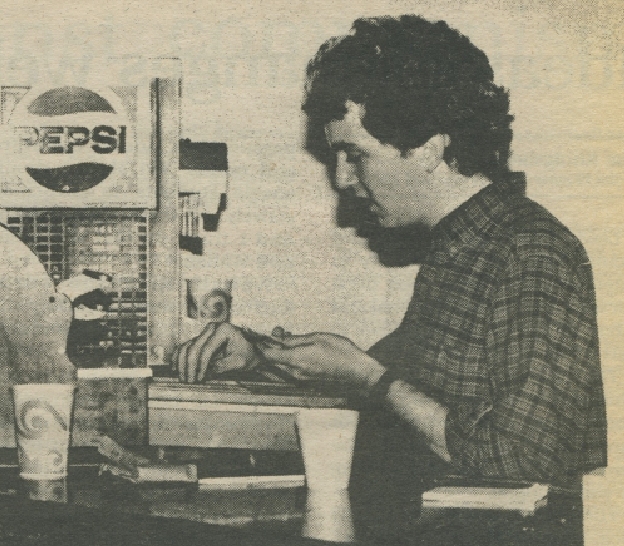
By Caleb Diehl /// Managing Editor
Staff Writer Jed Cauffman entered the new Rusty Nail co-op in the Copeland basement in October 1973 to the rhythm of hammering, “slightly off-beat to Neil Young’s second album.” He found Chris Potter, one of the business managers, fixing up the bar. Construction and maintenance manager Jim Doherty, “his countenance stern, his tone serious,” explained that the Nail would give students a “counterpart to classroom learning,” a space to learn about each other.
Inside the “very cosmic coffee shop,” the managers promised “live entertainment every night and friendly people all over the place.” The menu offered ham, salami, bologna, cheese, apples, nuts, pickles, apple juice, coffee and tea. Marilyn Daubert, the Nail’s public relations and entertainment manager, hoped students would treat the place as more than somewhere they could “pick up a few spoons.”
After earning approval from President John Howard and the Copeland Dorm Council, the Nail opened on Wednesday, Oct. 17. That night, the place was packed to capacity—Cauffman even saw Howard.
Throughout 1973, fire, health and safety inspectors visited the Nail, and every time shut it down for repairs. A Pioneer Log staff writer called the management, “loosely organized and understaffed.” Still, students returned for the “cheap prices, drinks by the pitcher, and an intimate low-light atmosphere.” The Nail made a profit of $500, to go to its Dorm Council loan and plans for a new music system.
Over the summer, students revamped the kitchen facilities, raised the number of managers to six and limited shifts to an hour. Throughout 1974, students came for poker night on Wednesday and special meal night Sunday, when they could “try each others’ specialties,” provided they made a reservation. Despite two break-ins, the Pioneer Log reported “a new optimism.”
In February 1975, the assistant director of residence halls went to a concert and was appalled to find two band members drinking Budweisers onstage. A student identified in the Pioneer Log only as “Dionysus,” had passed out “the celebrated liquid,” while the Nail’s manager was away cramming for midterms. Administrators shut down the Nail for violating the college’s alcohol policy and jeopardizing its relationship with the Oregon Liquor Control Commission.
“I spoze [sic] I’m just a deranged alcoholic,” Dionysus told The Pioneer Log, “enthralled with the notion of dragging others into my own decadence.”
By 1980, despite meeting with business and economics professors, the long-haired, bearded manager Bob Henry ran the Nail $2,000 into debt, partly a result of a $1,300 sink and a case of arson. The Nail added managers and a bookkeeper after Henry concluded “it’s just too big of a job for one man.”
In 1981, the Dorm Council paid off the Nail’s debt. The managers owed money to Pepsi, but they had time and credit. Their new “snack-oriented” menu featured hot cider, ice cream, chips, candy and Pepsi, and the Nail’s famous bagels and nachos. Managers planned weekend backgammon and poker tournaments. Though sloppy bookkeeping, alcohol violations, and too many free sandwiches would continue to plague the Nail, on the Superbowl Sunday of Jan. 25, the managers were ready to “reopen a Lewis & Clark tradition.”
Caleb Diehl is the Managing Editor of The Pioneer Log. His work has also appeared in The Park Record and on the Lewis & Clark School of Education and Counseling website. He is a contributing writer to the LC Journal for Social Justice.
Subscribe to the Mossy Log Newsletter
Stay up to date with the goings-on at Lewis & Clark! Get the top stories or your favorite section delivered to your inbox whenever we release a new issue.

Leave a Reply